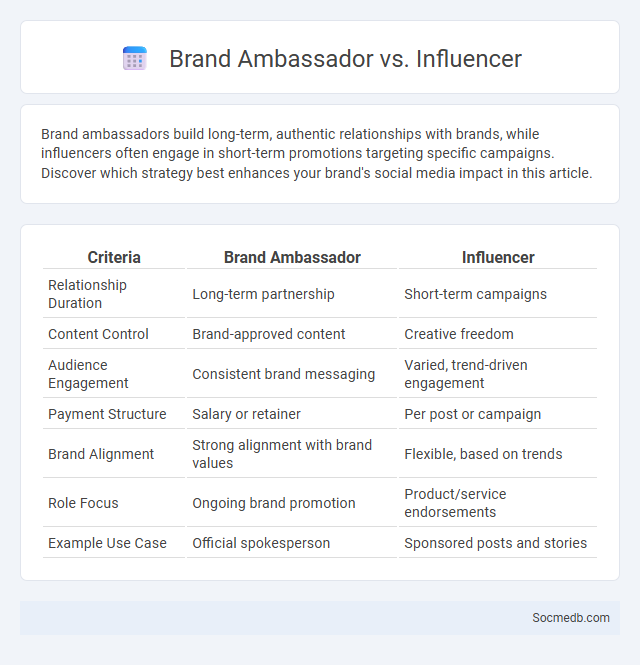
Photo illustration: Brand Ambassador vs Influencer
Brand ambassadors build long-term, authentic relationships with brands, while influencers often engage in short-term promotions targeting specific campaigns. Discover which strategy best enhances your brand's social media impact in this article.
Table of Comparison
| Criteria | Brand Ambassador | Influencer |
|---|---|---|
| Relationship Duration | Long-term partnership | Short-term campaigns |
| Content Control | Brand-approved content | Creative freedom |
| Audience Engagement | Consistent brand messaging | Varied, trend-driven engagement |
| Payment Structure | Salary or retainer | Per post or campaign |
| Brand Alignment | Strong alignment with brand values | Flexible, based on trends |
| Role Focus | Ongoing brand promotion | Product/service endorsements |
| Example Use Case | Official spokesperson | Sponsored posts and stories |
Understanding the Key Roles: Brand Ambassador vs Influencer
A brand ambassador maintains a long-term relationship with a company, consistently promoting its products and values to build trust and loyalty among a dedicated audience. Influencers engage with followers through sponsored content, often showcasing trends and products to generate immediate interest and sales, usually on a campaign-by-campaign basis. Both roles leverage social media platforms like Instagram, TikTok, and YouTube but differ in strategy, duration, and audience engagement mechanisms.
Definitions: What is a Brand Ambassador?
A Brand Ambassador is a person who represents and promotes a company's products, services, or overall image on social media platforms, leveraging their influence to build brand awareness and trust. They engage with followers by sharing authentic content, reviews, and endorsements that align with the brand's values and target audience. Brand Ambassadors play a crucial role in enhancing customer loyalty and driving organic marketing efforts through consistent, genuine online interactions.
Definitions: What is an Influencer?
An influencer is a social media user who has established credibility and a loyal following within a specific niche, leveraging their audience to shape opinions and behaviors. These individuals create engaging content across platforms like Instagram, YouTube, and TikTok, effectively driving brand awareness and consumer decisions. Influencers vary in scale from nano-influencers with smaller, highly engaged communities to macro-influencers with millions of followers.
Core Responsibilities of Brand Ambassadors
Brand ambassadors amplify brand visibility by creating authentic social media content that resonates with target audiences, increasing engagement and brand loyalty. They monitor online conversations and respond to customer inquiries to maintain a positive brand image and support community building. Consistently collaborating with marketing teams, brand ambassadors provide valuable consumer insights that shape campaign strategies and product development.
Core Responsibilities of Influencers
Influencers hold the core responsibility of creating authentic and engaging content that resonates with their target audience to build trust and loyalty. They must disclose sponsored partnerships transparently to comply with advertising regulations and maintain credibility. Consistent interaction with followers through comments, live sessions, and direct messages fosters a strong community and enhances influencer marketing effectiveness.
Relationship with Brands: Ambassadors vs Influencers
Brand ambassadors cultivate long-term relationships with companies, consistently promoting products with genuine loyalty that enhances your brand's credibility and trustworthiness. Influencers, often engaged for short-term campaigns, offer rapid exposure and targeted reach by leveraging their sizable and active follower base. Choosing between ambassadors and influencers depends on your marketing goals, whether you prioritize sustained brand affinity or immediate audience impact.
Duration and Commitment Level: Long-term vs Short-term Partnerships
Social media partnerships vary significantly in duration and commitment level, with long-term collaborations fostering consistent brand messaging and deeper audience engagement. Short-term partnerships are typically campaign-focused, driving immediate results but lacking sustained interaction and loyalty. Your choice between long-term and short-term social media partnerships should align with your marketing goals and resource availability to maximize impact.
Measuring Impact: Brand Ambassadors vs Influencer ROI
Measuring impact between brand ambassadors and influencers involves evaluating engagement metrics, conversion rates, and audience reach to determine return on investment (ROI). Brand ambassadors typically provide sustained, authentic promotion, resulting in higher trust and long-term customer loyalty, whereas influencers offer rapid visibility through broader but sometimes less engaged audiences. Your strategic choice should rely on analyzing specific campaign goals and detailed performance data to maximize marketing effectiveness.
Choosing the Right Strategy: When to Use Ambassadors or Influencers
Choosing the right social media strategy involves evaluating the brand's goals and target audience to determine whether ambassadors or influencers are more effective. Brand ambassadors provide long-term, authentic representation, fostering deeper customer loyalty through consistent engagement. Influencers deliver broader reach and quick impact with targeted content, ideal for launching new products or campaigns requiring rapid visibility.
Brand Ambassador vs Influencer: Which is Best for Your Brand?
Choosing between a Brand Ambassador and an Influencer depends on your marketing goals; Brand Ambassadors typically foster long-term relationships and consistently represent your brand values, enhancing trust and loyalty. Influencers offer broader reach and immediate engagement through their dynamic, content-driven presence, ideal for short-term campaigns or product launches. Understanding your target audience and campaign objectives helps determine whether sustained brand advocacy or rapid, widespread exposure aligns best with your brand strategy.
 socmedb.com
socmedb.com